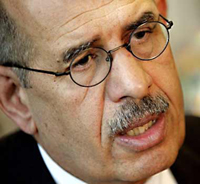India to unveil civilian nuclear program to IAEA

India to start talks with the International Atomic Energy Agency which demands the country to give an overview of much of New Delhi's civilian nuclear program.
The decision moves India closer to finalizing a controversial nuclear cooperation deal with the United States.
An IAEA statement said Department of Atomic Energy Chairman Anil Kakodkar and IAEA chief Mohamed ElBaradei agreed to "initiate consultations on an India-specific safeguards agreement," with the two sides hold their first technical meeting later this week.
The U.S. government hailed the agreement as the cornerstone of a new partnership between emerging power India and the United States. And India's government depicts it as crucial to meet the country's growing energy needs and bring it into the nuclear mainstream after decades of outsider status.
But critics say it undermines the Nuclear Nonproliferation Agreement by rewarding a nation that circumvented it to develop a nuclear weapons program when Washington is trying to rein in Iran's nuclear ambitions out of fears it, too, seeks nuclear technology to build the bomb.
And they argue that any "India-specific" safeguards could allow New Delhi to place restrictions on the number of civilian reactors open to inspection, while leaving others free from IAEA oversight - freeing them to produce uranium for India's weapons program.
Before the deal is signed, it still has to be approved by the Nuclear Suppliers Group, a group of nations that export nuclear material. Some countries in that group remain opposed to any agreement with India that would circumvent Nuclear Suppliers Group rules calling for full-scope safeguards on all nuclear facilities of all countries except the United States, Russia, China, Britain and France - the formally declared nuclear weapons states - as a condition of doing business.
The deal also must face another review by the U.S. Congress, where some members fear that the extra fuel the measure provides could boost India's nuclear bomb stockpile.
That, they worry, could spark a nuclear arms race in Asia, where neighboring Pakistan and China also already have nuclear weapons.
The Vienna meeting between Kakodkar and ElBaradei came just days after communist parties that support India's ruling coalition backed away from their strong opposition to the nuclear deal with Washington. The four parties had argued the pact would ties to the U.S, but relented in the face of weakening popularity.
Subscribe to Pravda.Ru Telegram channel, Facebook, RSS!


